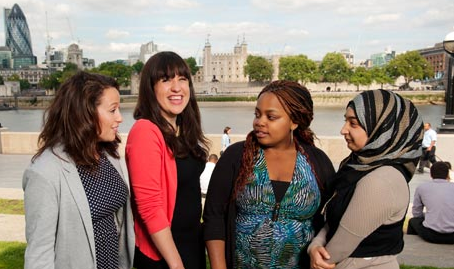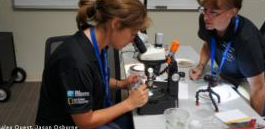New study on STEM research mentors’ engagement in race/ethnicity issues
 Butz, A. R., Spencer, K., Thayer-hart, N., Cabrera, I. E., & Byars-winston, A. (2018). Mentors’ Motivation to Address Race/ethnicity in Research Mentoring Relationships. Journal of Diversity in Higher Education. doi:10.1037 /dhe0000096
Butz, A. R., Spencer, K., Thayer-hart, N., Cabrera, I. E., & Byars-winston, A. (2018). Mentors’ Motivation to Address Race/ethnicity in Research Mentoring Relationships. Journal of Diversity in Higher Education. doi:10.1037 /dhe0000096
Summarized by Cyanea Poon
Notes of Interest: Using the self-determination framework, this study sought to investigate STEM research mentors’ motivation to address race/ethnicity issues. The results from this study provide evidence that more work is needed to convince certain mentors the value of culturally responsive mentoring. Recommendations on how to build confidence and readiness to engage in STEM mentors are discussed.
Introduction (Reprinted from the Abstract)
The purpose of this study was to investigate the motivation of research mentors to address race/ethnicity in their research mentoring relationships, using self-determination theory as a conceptual framework. Mentors from science, technology, engineering, or mathematics (STEM) fields primarily in the biological sciences (N 115) were asked to report their level of motivation and the reasons behind their motivation to address the role of race and ethnicity in their mentoring relationships. Mentors’ responses were coded using a qualitative approach, and results were examined by mentors’ degree of motivation, previous experience with mentoring trainees from different racial– ethnic groups, and mentor race/ethnicity. Extrinsic motivation and amotivation were the most frequently assigned codes to mentors’ responses. Implications of these findings for mentor practices, higher education initiatives, and diversifying the STEM workforce are discussed.
Implications (Reprinted from the Discussion)
Mentors at all ends of the motivation spectrum may better support their mentees by moving toward a more internalized motivation to address race and ethnicity and contributing to a research and institutional environment that fosters their competence, autonomy, and relatedness. For mentors who do not see the relevance of race/ ethnicity to mentoring or who lack confidence to broach the topic with their trainees, evidence-based mentor-training interventions (e.g., Byars-Winston et al., 2018; Carnes et al., 2015) may be an effective way for mentors to learn about the science that supports the connection between cultural diversity and the research experience.
Future interventions and trainings that explore the role of cultural identity in mentoring relationships would be well served to invite mentors to examine their own motivations for addressing (or not addressing) this topic as a means of raising cultural awareness and promoting honest conversations about identity as it relates to trainees’ research experiences. Because mentors cannot know whether racial– ethnic matters are important to their trainees or are of interest to them to discuss, we encourage mentors to consider having general conversations early in mentoring relationships that signal that racial– ethnic topics are acceptable to discuss. Mentors might consider including items in their office or research space that represent their social identity (e.g., family photos, posters, or items that represent their racial– ethnic heritage or places, people, and ideas important to them); such artifacts can indicate to trainees that mentors are open to bringing their identity into the research space and that trainees are welcome to do so as well. Mentors might also consider asking their trainees why they chose their major or career, or mentors might disclose why they themselves chose a career path or instances where they encountered difficulties. In other words, we encourage mentors to lead discussions by example by being prepared and willing to share as appropriate.
To help build confidence and readiness to engage in culturally responsive mentoring, individual faculty members, graduate students, and postdoctoral researchers mentoring trainees may want to take advantage of synchronous and asynchronous mentor training opportunities available through organizations like the National Research Mentoring Network, which offers training, resources, and community for research mentors committed to improving research mentoring in STEM. In addition to implications for individual mentor practice, our findings point to the need for commitment from institutions to build mentors’ capacity to engage thoughtfully in race/ethnicitysalient discussions. An institutional commitment to broadening diversity in STEM necessitates increasing the racial– ethnic diversity of individuals in these disciplines by increasing the capacity of individuals to make STEM disciplines a more welcoming and inclusive space. To this end, institutions of higher education can support research mentor training offered as professional development alongside research experiences for trainees (Pfund, Maidl Pribbenow, Branchaw, Miller Lauffer, & Handelsman, 2006).
Mentor training curricula, such as Entering Mentoring (Pfund, Branchaw, & Handelsman, 2015), is widely available and shown to be effective in improving research mentoring relationships in the sciences (Pfund et al., 2006). This curriculum focuses on competencies of effective mentoring relationships such as aligning expectations, promoting professional development, maintaining effective communication, addressing equity and inclusion, assessing understanding, fostering independence, cultivating ethical behavior, and articulating a mentoring plan. Program directors may do well to provide professional development opportunities using these evidence-based trainings as part of preparation for mentors working with students. By creating a departmental and institutional culture that promotes and actively engages in these discussions, addressing race and identity becomes less of an exception and more of a norm. In so doing, departments and institutions can foster a sense of belonging and connectedness (i.e., relatedness) around the common goal of broadening participation in STEM.
To access this article, click here.










